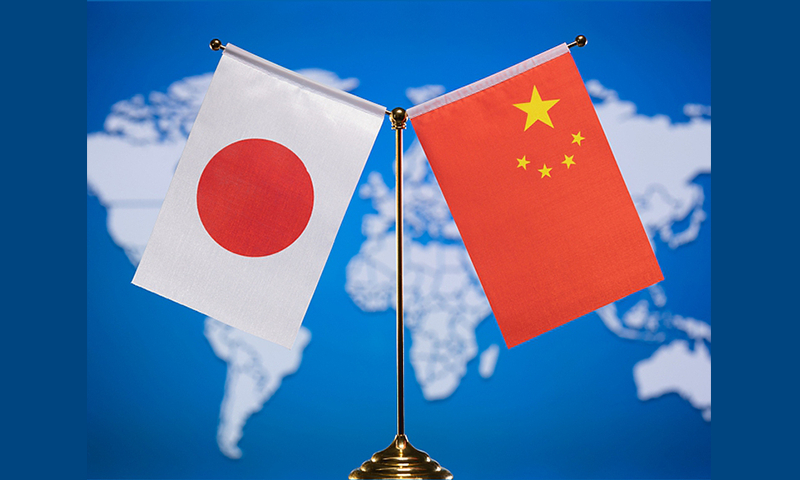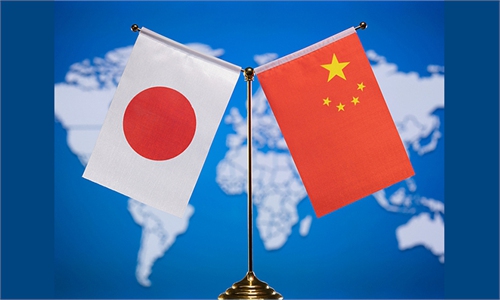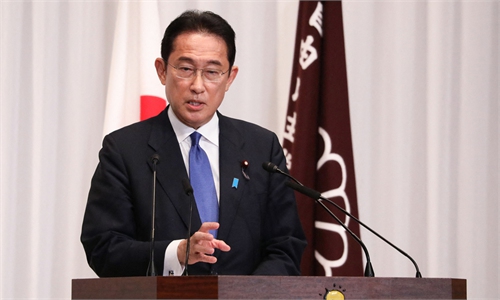Chinese envoy urges Japan to take rational policy, implement top leaders' consensus

China Japan
Despite some ups and downs, China-Japan relations are moving forward, the top Chinese diplomat to Japan said in an interview with Japanese media, calling on Japan to work with China to implement the consensus reached by their top leaders. Given some recent warming signals in bilateral ties brought by increasing exchanges, analysts urged the Japanese government to listen to the rational voices in Japan and stop following some other country in hyping the "China threat" theory or provoking China on its core interests.
China and Japan are important neighbors and cooperation partners, and realizing mutual benefit has always been the mainstream of China-Japan cooperation, Chinese Ambassador to Japan Kong Xuanyou said in an interview with Kyodo News on Thursday.
When asked whether Chinese President Xi Jinping will make a state visit to Japan, Kong noted that high-level exchanges have played an irreplaceable role in guiding bilateral relations, and that since this year, the top leaders have maintained positive interactions via various channels to promote bilateral relations. President Xi's meeting with Japanese Prime Minister Fumio Kishida in Bangkok, Thailand on November 17 pointed out the future direction for bilateral relations.
Kong expressed hope that Japan will work with China in the same direction to keep the momentum on communication at different levels and in different fields in order to further promote mutual trust and create a positive environment for top leaders' interactions.
Xi and Kishida's meeting in Bangkok was held at a time when China-Japan relations face a slew of challenges, and experts said it is crucial for the two countries to explore cooperation potential while drawing clear red lines on matters concerning China's core interests, especially on the Taiwan question, as Japan is working to further strengthen its alliance with the US.
Kong also stressed to Kyodo News the importance of the one-China principle, and said most countries in the world, including the US and Japan, had made a commitment to China on the Taiwan question, and this is also an important political base for establishing bilateral relations with China.
However, some Japanese politicians hyped the Chinese mainland's actions concerning the island of Taiwan as a danger to Japan. Kong said such remarks are extremely dangerous and go against the political consensus between China and Japan, and they may also push Japan to break from its peaceful development track and sink into an abyss of geopolitical confrontations.
The basic structure for China-Japan relations is stable and constructive, but China should again stress its bottom line to Japan given the Japanese government's take on the Taiwan question, the Diaoyu Islands and Tokyo's active engagement in the US' strategy to contain China, Da Zhigang, director of the Institute of Northeast Asian Studies at Heilongjiang Provincial Academy of Social Sciences, told the Global Times.
Conservative Japanese forces have intensified their accusations against China over the Taiwan question, especially after US House Speaker Nancy Pelosi's highly provocative visit to the island, and analysts said that after the Russia-Ukraine conflict, some forces in Japan have ramped up efforts in using these hot-button topics to stoke the Japanese public's anxiety over their external environment, causing the whole of society to lean further right.
On Monday, Kishida instructed his defense and finance chiefs to boost defense spending to 2 percent of GDP by 2027, Japanese media reported. The move has widely raised concerns in Asian countries, as it may bring more uncertainty to the region given Japan's militarist past.
Japan may further promote its military strength targeting China if it puts the country at the top of the list of what it sees as regional security challenges in the revised the National Security Strategy at the end of the year - this would be a huge blow to bilateral relations, said Hu Jiping, vice president of the China Institutes of Contemporary International Relations.
Amid the US' increasing confrontation against China, analysts have called on Japan to maintain strategic independence and cherish its hard-won relations with China. They also called on the Japanese government to listen to the rational voices from the Japanese people instead of following the US in containing China.
Kong also mentioned strategic independence during the interview with Kyodo News, and said that China has no intention of interfering with other countries' alliances, but they should not target any third party or violate regional peace and stability. Confrontation is a dead end while cooperation is the general trend, and any attempt to contain other countries by forming alliances will eventually reach a dead end, he said.
We hope Japan will gain a clear knowledge of the general trend and follow it to have rational and active foreign policies and make the strategic choice that truly fits its own and the region's interests, said Kong.
Despite the provocations made by some Japanese politicians, China-Japan relations have seen some warming signals recently, analysts said. For example, a bilateral military hotline began operations and many activities have been held in both China and Japan to celebrate the 50th anniversary of the normalization of bilateral relations.
Kong also noted that with the optimization of COVID-19 prevention measures, people-to-people exchanges between China and Japan are gradually recovering.
Exchanges between the two peoples and close trade relations have and will always play a significant role in promoting bilateral relations, and these active and positive factors will also help dismiss misunderstandings and hedge political disputes, said observers.


